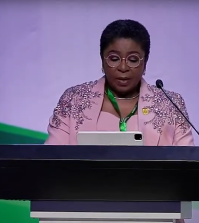Trump supporters develop ‘blacklist’ of federal workers, UK civil service prepares for election results, and more

Hello and welcome to our Management and Workforce Monitor newsletter. This month, we’re focusing on how some of 2024’s elections around the world could impact public service management.
In this month’s edition:
- Trump supporters develop ‘blacklist’ of federal workers
- UK civil service prepares for election results
- GGF’s Women into Leadership training
- Why forming a government in France will be a tall order after this week’s elections
- Watch: Boosting skills across the public service to drive reform
- Coming up at AccelerateGOV: How to build a culture that can drive government transformation
- The UK taxi driver still being paid as a Nigerian civil servant
Trump supporters develop ‘blacklist’ of federal workers

In this year of elections around the globe, the biggest event among them – the US presidential campaign – is now in full swing. Joe Biden’s poor performance in last week’s presidential debate has led to speculation on whether the Democrats will change their nominee, but it also means there’s increased scrutiny of Donald Trump’s plans should he return to the presidency.
Key among Trump’s pledges is a plan to reintroduce the Schedule F powers that allow him to remove career civil servants from their posts. A Trump-aligned think-tank is now developing a list of officials it considers hostile to Trump, which it plans to share publicly.
What is Schedule F? When he was president, Donald Trump introduced new rules to expand the number of political appointments. Currently, only the top ranks of the American public service are appointed by the president, but Trump’s executive order in October 2020 sought to move federal workers in policy-orientated roles from the government’s main federal pay scale (known as the General Schedule) to ‘Schedule F’. This was intended to be a new category under which the usual civil service protections would not apply, making it easier for the president to remove federal employees. It came at a time when Trump was describing the permanent federal civil service as part of the “deep state”.
What happens next? Trump was unable to move any workers to Schedule F before January 2021, when Biden took office and rescinded the directive, but Trump is now Republican nominee for November’s election, and has pledged to reintroduce the rule. Further, a Trump-supporting think-tank The American Accountability Foundation is working on a list of officials whose roles could get moved to the Schedule F provisions under what it is calling Project Sovereignty 2025.
Project Sovereignty 2025 explained: The think tank has said it will build “a database of bureaucrats in the Department of Homeland Security, as well as other departments and agencies, who are the architects and advocates of the Biden administration’s disastrous open-borders policies”. The group said it would be releasing information on these officials because “if allowed to remain in their positions operating in the shadows, they can be expected to obstruct any future president’s effort to fix the problem and secure the border”.
‘Intimidation of civil servants’: Responding to the proposal, the American Federation of Government Employees said that the plan amounted to “an intimidation tactic to try to menace federal workers and sow fear”.
Loyal to the constitution, not the president: In a statement on X, the AFGE added: “Civil servants are required to take an oath to the Constitution – not a loyalty test to a president.”
‘Deep animus to state actors’: Donald Moynihan, a political scientist and the McCourt chair of Georgetown University’s McCourt School of Public Policy, told the Guardian that the project revealed a “deep animus towards state actors who are seen as disloyal to the party and party ideology, and a desire to punish those actors”. Moynihan said it’s also important to consider Project Sovereignty 2025 in the context of broader patterns of intimidation against individuals across institutions, and across all levels of government.
Change could affect 50,000 civil servants: Speaking at a UK Institute for Government event on global approaches to civil service impartiality last July, Moynihan warned that Republicans could politicise 50,000 civil service jobs.
An ‘unexploded mine’: He went on to say that the policy represents “a very large unexploded mine sitting in the field of good governance in America, where it’s going to matter not just to the quality of policy advice or implementation, but also to the security of democracy”. He added that there are dangers of a “president who can reach so deeply into the career civil service, and toss out people who are not going to be acquiescent to his wishes”.
UK civil service prepares for election results

On the other side of the Atlantic, the UK will hold a general election this week, with polling suggesting that the Labour Party will likely lead the next government.
What this means: The Labour Party has set out five missions that it intends to focus on to “tackle the deep-rooted challenges” the UK faces. These five priorities, which are intended to form part of a “decade of national renewal”, are:
1) Kickstart economic growth
2) Make Britain a clean energy superpower
3) Take back our streets
4) Break down barriers to opportunity
5) Build a National Health Service fit for the future
Labour has admitted this will require a new approach to government, with “ambitious, measurable, long-term objectives” that provide a driving sense of purpose for the country. It means a new way of doing government that is more joined up across departments and agencies, according to the party’s manifesto.
How to structure government: Although there is no detail on how Labour will structure government in the manifesto, there has been some reporting on possible post-election structures of Whitehall.
According to the Financial Times, Labour will create cross-departmental ‘boards’ that will bring together civil service delivery focused on these key missions, as well as private sector expertise.
These would be headed by Starmer himself, with the key objective of breaking down silos and tackling problems that arise when policy responses are split between different departments and budgets.
How to make it work: Alex Thomas, programme director at the Institute for Government think-tank, told the FT that a “full-fat version” of these mission boards – that gives each mission its own budget with a named responsible official – would be a radical shift and “the biggest change to how the civil service and government have been organised for several decades”.
What to watch for next: If, as expected, Starmer becomes prime minister on Friday, he will set out his cabinet members and other ministers in the following days. Ministers will meet with civil servants to discuss their priorities. Earlier in the campaign, Global Government Forum set out the steps that civil servants are taking to prepare for the next government in a webinar. Read a summary and watch in full here.
Whitehall change: Over the medium term, there could also be changes to the senior civil servants in government. It has been reported in the Sunday Times that the UK’s top civil servant, cabinet secretary Simon Case, could leave his post in the new year after leading the transition to the new government.
According to the newspaper, Case held an away day for departmental permanent secretaries on how to deliver on Labour’s mission, but he anticipates leaving government around the start of next year.
Runners and riders for next UK cabinet secretary: With Case likely to move on early in the life of the next government, speculation is rife on who could succeed him as the UK’s top public official.
One name that has been linked to the role is Olly Robbins, the former permanent secretary at the Department for Exiting the European Union and chief Brexit negotiator to former UK prime minister Theresa May. Robbins left the civil service in 2019 and is currently working for consultancy firm Hakluyt, where he has just become a partner.
Other potential candidates reported by the Times and Financial Times include:
- Dame Antonia Romeo, the departmental permanent secretary at the Ministry of Justice
- Tamara Finkelstein, departmental permanent secretary at the Department for Environment, Food and Rural Affairs
- Jeremy Pocklington, departmental permanent secretary at the Department for Energy Security and Net Zero
- Sir Peter Schofield, departmental permanent secretary at the Department for Work and Pensions
- Sarah Healey, departmental permanent secretary at the Department for Levelling Up, Housing and Communities
- Dame Melanie Dawes, Ofcom chief executive and former housing ministry permanent secretary
- Dame Sharon White, chair of retailer John Lewis Partnership and former Treasury second permanent secretary
End of the ‘blob’: Whoever leads government, there is an expectation that there will be a “reset of relations” between the civil service and ministers. At various times in the 14 years the Conservatives have led the UK, relations between the political and official sides of the British state have often been at loggerheads, with civil servants being described as “the blob” that hinders action. Previously, Case has called on politicians to stop using the term.
Case said last year that attacks on officials “individually and collectively” had increased, adding that the resulting climate had “undoubtedly undermined the good functioning of government”.
GGF’s Women into Leadership training

Women are often under-represented at the higher organisational levels in the public sector. According to Global Government Forum research, less than one in three senior civil servants across the governments of G20 countries are women, and only one G20 country – Canada – has reached gender parity in the top five grades of its public service.
To help close this gap, Global Government Forum is providing Women into Leadership training across two stand-alone but complementary seminars that look into a wide range of issues affecting women who are either looking to move into leadership roles, or who are already in such roles and wish to equip themselves for a further upwards move.
The next course will take place on 9 July and will cover the resources that are available to develop women leaders, examine key skills such as mindset, emotional intelligence and assertive communication, and explore how to achieve your potential.
Find out more and book here
Why forming a government in France will be a tall order after this week’s elections

It is not just in the UK where there is an election this week. France is also going to the polls after president Emmanuel Macron called a snap election. Voting is split into two rounds, and exit polls after the first round indicate the far-right National Rally party leading with about 34% of the vote. The New Popular Front (a coalition of parties from the far left to the moderate left) was in second with about 28%, and President Emmanuel Macron’s centrist coalition was a distant third with about 20%.
Stage 2: Romain Fathi, a senior lecturer in the School of History at the Australian National University, highlighted that this was by far the largest amount of votes the far right has received in legislative elections since the second world war. However, Fathi wrote that alliances are likely to coalesce between the leftist, centrist and moderate right political parties this week to form a united front against far-right candidates when the second round of voting takes place this weekend.
Difficult to govern: It likely means that it will be difficult for National Rally leader Marine Le Pen and president Jordan Bardella to secure enough seats in the National Assembly next Sunday to win an absolute majority, and the second round will determine whether France has a far-right government, a hard-left government, or a government of moderates united against extreme factions at both ends of the political spectrum.
What happens now in France? “Although the third solution appears more plausible than the other two, it still may not guarantee political stability. Diverse coalitions don’t have a strong track record of stable government in France,” writes Fathi.
Read more: For more insight on the various political groups in the National Assembly, read the full article here: The far right has surged to the lead in France’s elections. But forming a government remains a tall order.
Watch: Boosting skills across the public service to drive reform

Public and civil services need to develop skills to make sure they are able to deliver services that citizens demand in the 21st century. However, skills are also required to help drive the reforms of public services themselves.
This challenge is all the more acute in younger democracies, where there is not the history of looking to develop skills to drive institutional reform for the good of the whole population. This webinar looked at how these countries can boost the skills of their public and civil servants in areas such as public service delivery, procurement, digital development, project management, and finance.
Watch the webinar in full here
Coming up at AccelerateGOV: How to build a culture that can drive government transformation

Bringing together public service leaders from around the world in Ottawa, AccelerateGOV explores how public servants can best promote digitalisation and transformation.
The agenda: AccelerateGOV will bring together Canadian public servants to discuss key issues including how to deploy artificial intelligence; better use of data; and how to build a culture that can drive transformation.
Sessions include: How to build a culture that can drive government transformation, which will look at how governments can build a culture that accepts the need to take risk.
Confirmed speakers: Alex Benay, assistant deputy minister of public services and procurement, Enterprise Pay Coordination, Public Services and Procurement Canada, is confirmed to speak in the session, with more speakers to follow.
Register now: AccelerateGOV takes place on 21 October at the Shaw Centre in Ottawa. Register now to attend.
The UK taxi driver still being paid as a Nigerian civil servant

Some former civil servants in Nigeria are still getting paid despite no longer working for the government, according to a report, and the country’s president has ordered a crackdown.
What happened? According to a report on the BBC, officials can sometimes continue to get paid even when they move abroad because they do not formally resign, with their salary then divided between the supervisor who keeps quiet and the person being paid, sometimes along with an HR representative.
One case in the UK: The BBC article highlights the case of one official, who they call Sabitu Adams, who has moved from Nigeria to the UK, where he now works as a taxi driver but still receives his salary of 150,000 naira ($100/£80) as he did not quit his role. “To be honest I didn’t resign because I wanted to leave that door open in case I choose to go back to my job after a few years,” he is quoted as saying. “I had a good understanding with my boss and he just let me leave”. In this case, his boss was also a relative.
Presidential crackdown: Now, president Bola Tinubu has ordered a crackdown of the practice, saying the money was paid fraudulently. However, it is not yet clear what actions the president is actually taking.
Thanks for reading this month’s Management and Workforce Monitor newsletter. Please provide any feedback to me on email, and see you next month.















